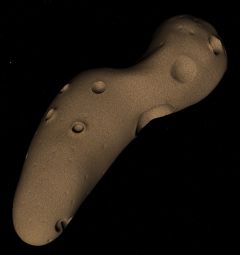Difference between revisions of "433 Eros"
(Added Note.) |
(Added table line item.) |
||
| (3 intermediate revisions by the same user not shown) | |||
| Line 2: | Line 2: | ||
!bgcolor="lightsteelblue" colspan="2" align="center" |433 Eros | !bgcolor="lightsteelblue" colspan="2" align="center" |433 Eros | ||
|- | |- | ||
| − | |colspan="2" align="center"|[[Image: | + | |colspan="2" align="center"|[[Image:433Eros-Asteroid3Dzip-Orbiter2016D3D9.jpg|240px]] |
|- | |- | ||
|colspan="2" align="center"|'''433 Eros''' | |colspan="2" align="center"|'''433 Eros''' | ||
| Line 52: | Line 52: | ||
|width="30%"|Gravity at surface||aligh="right" width="30%"|Eros 67%<br>Sun 33% | |width="30%"|Gravity at surface||aligh="right" width="30%"|Eros 67%<br>Sun 33% | ||
|- | |- | ||
| − | |width="30%"|Note||align="right" width="30%"|*Elements given are from Eros.cfg | + | |width="30%"|Note||align="right" width="30%"|*Elements given are from Eros.cfg (Asteroid 3D.zip) |
|} | |} | ||
| Line 63: | Line 63: | ||
Eros appears as a very elongated brown colored object with a few craters and a narrowing near one end near the North Pole. | Eros appears as a very elongated brown colored object with a few craters and a narrowing near one end near the North Pole. | ||
| − | Note that the landing surface as given in the config file is spherical, but the visual of | + | Note that the landing surface as given in the config file is spherical, but the visual of Eros is not, if you land, you will likely be above or below the visual surface. |
{| class="wikitable" style="text-align: center" | {| class="wikitable" style="text-align: center" | ||
| Line 69: | Line 69: | ||
|- | |- | ||
!Add-on!!Source!!Version!!Author!!Type!!Release Date!!Compatibility!!Wiki article | !Add-on!!Source!!Version!!Author!!Type!!Release Date!!Compatibility!!Wiki article | ||
| + | |- | ||
| + | |[https://www.orbiter-forum.com/resources/celestial-bodies-motion-part-2-4-v2-0-0.295/ Celestial Bodies Motion - Part 2/4 - v2.0.0]||O-F Resources||v2.0.0||cristiapi||Scenery||2 July 2015||*module only|| | ||
| + | |- | ||
| + | |[https://www.orbiter-forum.com/resources/3d-asteroids.2291/ 3D Asteroids]||O-F Resources||2014-11-06||T1234||Scenery||6 November 2014|||| | ||
|- | |- | ||
|[https://www.orbiter-forum.com/resources/asteroid-pack-1-00.2832/ Asteroid Pack 1.00]||O-F Resources||2004-11-21||Nighthawke||Scenery||21 November 2004|||| | |[https://www.orbiter-forum.com/resources/asteroid-pack-1-00.2832/ Asteroid Pack 1.00]||O-F Resources||2004-11-21||Nighthawke||Scenery||21 November 2004|||| | ||
| Line 74: | Line 78: | ||
===Gallery=== | ===Gallery=== | ||
| − | <gallery widths=" | + | <gallery widths="100" heights="100"> |
Eros-AsteroidPackv1zip-Orbiter2003P2.jpg|<center>433 Eros from ''AsteroidPack_V1.00.zip'' in Orbiter 2003P2</center> | Eros-AsteroidPackv1zip-Orbiter2003P2.jpg|<center>433 Eros from ''AsteroidPack_V1.00.zip'' in Orbiter 2003P2</center> | ||
| + | 433Eros-Asteroid3Dzip-Orbiter2016D3D9.jpg|<center>433 Eros from ''Asteroid 3D.zip'' in Orbiter 2016 with D3D9</center> | ||
Eros - PIA02923 (color).jpg|<center>433 Eros imaged by the [[w:NEAR Shoemaker|NEAR Shoemaker]] spacecraft in February 2000<br>from Wikimedia Commons</center> | Eros - PIA02923 (color).jpg|<center>433 Eros imaged by the [[w:NEAR Shoemaker|NEAR Shoemaker]] spacecraft in February 2000<br>from Wikimedia Commons</center> | ||
Eros May 7 2013.PNG|<center>Orbit of 433 Eros.<br>From Wikimedia Commons.</center> | Eros May 7 2013.PNG|<center>Orbit of 433 Eros.<br>From Wikimedia Commons.</center> | ||
| Line 83: | Line 88: | ||
[[Category:Articles|Eros]] | [[Category:Articles|Eros]] | ||
| − | [[Category:Celestial | + | [[Category:Celestial bodies|Eros]] |
[[Category:Solar System|Eros]] | [[Category:Solar System|Eros]] | ||
[[Category:Near-Earth objects|Eros]] | [[Category:Near-Earth objects|Eros]] | ||
| + | [[Category:Celestial body add-ons|Eros]] | ||
Latest revision as of 13:08, 10 November 2024
433 Eros is a small body add-on available in Asteroid Pack 1.00 released in 2004 by Nighthawke and in 3D Asteroids released in 2014 by T1234.
Eros was discovered in 1898 by Carl Gustav Witt at the Berlin Urania Observatory.
Eros in Orbiter[edit]
Eros appears as a very elongated brown colored object with a few craters and a narrowing near one end near the North Pole.
Note that the landing surface as given in the config file is spherical, but the visual of Eros is not, if you land, you will likely be above or below the visual surface.
| Add-on | Source | Version | Author | Type | Release Date | Compatibility | Wiki article |
|---|---|---|---|---|---|---|---|
| Celestial Bodies Motion - Part 2/4 - v2.0.0 | O-F Resources | v2.0.0 | cristiapi | Scenery | 2 July 2015 | *module only | |
| 3D Asteroids | O-F Resources | 2014-11-06 | T1234 | Scenery | 6 November 2014 | ||
| Asteroid Pack 1.00 | O-F Resources | 2004-11-21 | Nighthawke | Scenery | 21 November 2004 | ||
Gallery[edit]
433 Eros imaged by the NEAR Shoemaker spacecraft in February 2000
from Wikimedia Commons
| edit The Solar System | |
|---|---|
| Central star |
Sun (Sol) |
| Planets |
Mercury - Venus - Earth - Mars - Jupiter - Saturn - Uranus - Neptune |
| Natural satellites |
Moon - Phobos - Deimos - Io - Europa - Ganymede - Titan - more... |
| Add-ons |
Planets - Dwarf Planets - Small objects - Natural satellites - Alternative star systems |




